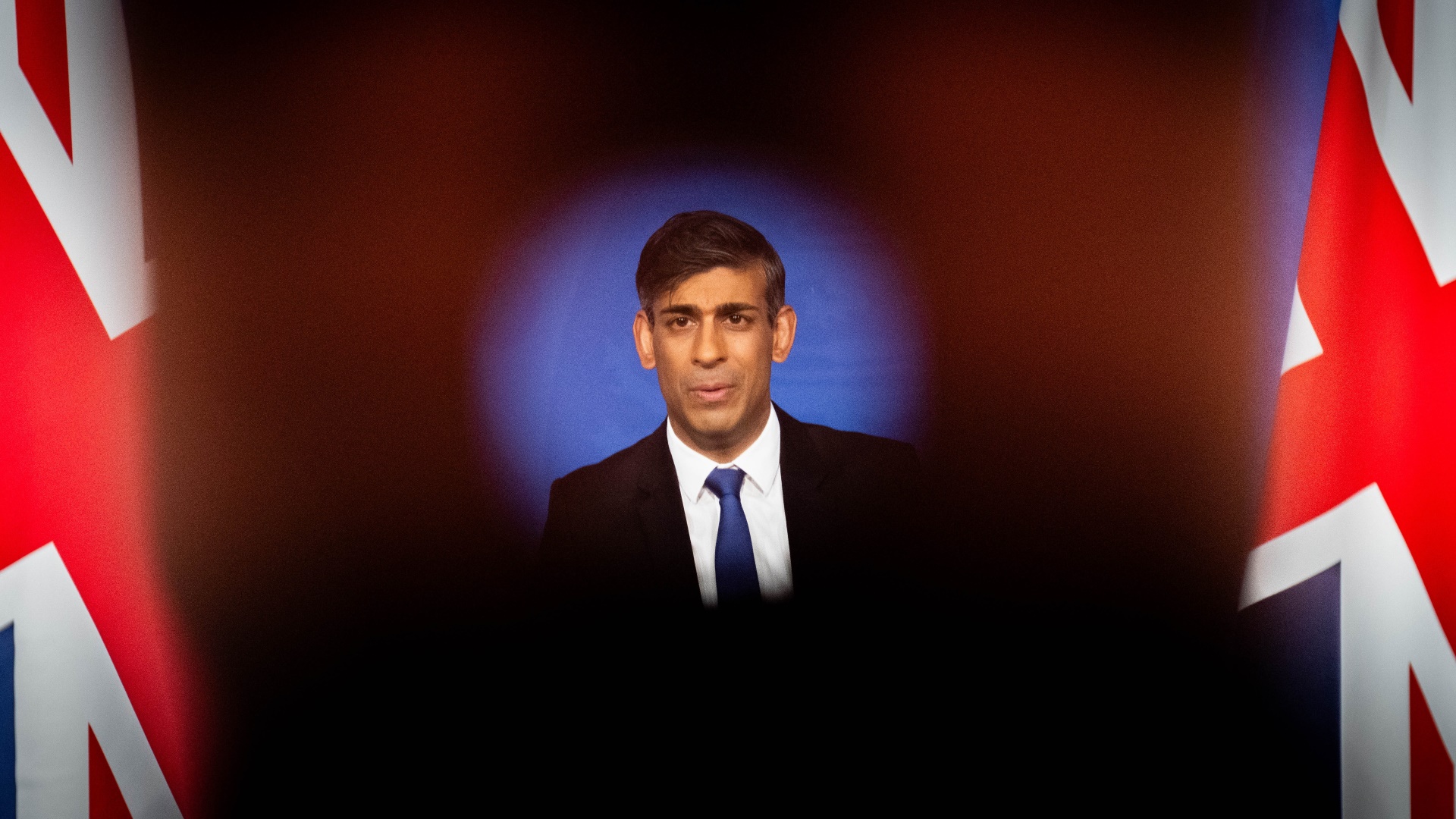Re: Patience Wheatcroft on “The next bitter Tory split” (TNE #367) over immigration and Rwanda. Roll on the next unelected PM. Is there a limit to unelected Tory prime ministers?
Clive Christopher
I agreed with all of Patience Wheatcroft’s prescient comment piece up to the last sentence, “If Sunak can’t be a credible leader for them, then they will find someone who can”. Surely, by now and for some years to come, no Conservative Party leader can be credible.
Roland Lazarus
Billericay, Essex
I am a British citizen. I met my wife while living abroad in Finland in 1976. In 1978 we married and in 1979 we decided to move to the UK and start our life together here.
Although Finland was not a member of the EU, as a UK citizen I was able to apply for my wife to get permission to reside in the country with little bureaucracy. We have lived here ever since, both contributing fully to the economy.
When we arrived we had not been married for more than two years and I had no job arranged. Although I found work soon after arriving, I worked in a factory earning much less than the national average.
It dismays me to discover that applying the rules of the recent immigration bill would mean our circumstances would have prevented us gaining a visa. My dismay turns to anger as I read of cases emerging of Brits living in Europe and married to EU citizens now unable to do what my wife and I did.
And all this purely in the pursuit of a dogmatic political obsession that defies all economic logic, not to mention the human distress it inflicts.
Paul Stein
Pickering, North Yorkshire
The only people who will ever be sent to Rwanda are UK home secretaries.
Tony Price
Via Facebook
It’s unlikely the government will ever fly any migrants to my house. However, I’d be happy to put on a show of signing a bit of paper with James Cleverly, so may I also have £290m please?
Amanda Baker
Edinburgh, Scotland
If removing boat migrants to Rwanda is supposed to be a deterrent to them coming, how many government representatives are visiting Lampedusa in Italy or Lesbos in Greece to dissuade those from Africa and the Middle East who have boated across the Mediterranean from going on to boat across the Channel? None?
And when or if the 100 migrants arrive in Rwanda, many of them Afghans or Syrians, how easily will they build lives in the new world the UK government has dumped them in?
Just a deceit to fool some voters and try to please the Tory backbenchers.
Chris Clode
Wrexham, Wales
Re: “Giving blood as an English alien” by Jane Whyatt (Carousel, TNE #367).
I am an 83-year-old German national who moved to the UK 48 years ago with my British husband and two sons, having met and married him in Germany, where he then worked. We brought up our children here in the UK, worked and paid our taxes.
On retirement, I started giving blood. Then Brexit changed our tranquil life. Suddenly I was regarded as an “alien” – not just by the people around us – the Home Office also made our life insecure.
This suddenly hostile, unfriendly environment affected me – people noticing my accent and asking where I came from, obviously thinking I was a scrounger taking advantage of the system. You could read that in their faces, their expressions.
I have since stopped giving blood, after having donated more than 40 times. If from one day to the next I am no good for this country then my blood also is no longer good for that country.
Gisela Greenaway
East Grinstead, West Sussex
Speechless
Re: James Ball on the Covid inquiry (TNE #367). Having watched Boris Johnson’s testimony, you are all paying the price for the ultimate English disease: the glorification of personal ignorance to the point that instead of being viewed for what it is, it is admired as exceptionalism.
Paolo Grossi
If there was any justice in this world Boris Johnson would be serving time for corporate manslaughter. Instead, he’s travelling the world, getting paid handsomely for making speeches.
Helen Wells
Mad methods
Re: Your “Acropolis Now” front page (TNE #367). Two exchanges from Francis Ford Coppola’s ageless Apocalypse Now sum up the state of this shambolic government.
First, when Martin Sheen’s character meets Marlon Brando’s, whom he has been sent to kill:
Willard: They told me that you had gone totally insane, and that your methods were unsound…
Kurtz: Are my methods unsound?
Willard: I don’t see any method at all, sir.
And second, when Willard encounters the chaos and madness of the Do Lung Bridge:
Willard: Who’s in charge here?
Machine gunner: Ain’t you?
Matthew Tate
Book worms
On the matter of what presents to buy for politicians (Mitch Benn, TNE #367), I’d give Rishi Sunak a year on the dole. For Keir Starmer I would buy two books: one on economics, the other on why nationalism isn’t patriotism and why pandering to nationalism always ends very, very badly.
Edward Bloomfield
Word play
Nigel Warburton’s thoughts on swearing (Everyday Philosophy, TNE #367) were interesting but he didn’t consider an important question that’s very rarely asked.
Why is a four-letter word, which in its original usage (as DH Lawrence demonstrated) refers to an act that is both pleasurable and essential for humanity’s survival, used in swearing to denote extreme disapproval?
Graham Colombé
Sheringham, Norfolk
Rejoinder
Re: Mandrake on the Lib Dems (TNE #367). They should be riding high on a Rejoin wave, but they seemed to have deliberately jumped off. They need to get rid of Ed Davey and put Layla Moran in place. Big mistake when they selected him over her.
Chris Marshall
The Lib Dems had one chance – support Rejoin – and they blew it. They’re not even a protest party any more. What is the point of them?
Steve Hughes
Borderline
Re: The Letters page discussion on Jonty Bloom’s view of an independent Scotland in the EU (TNE #367). True, this would require a border with England. With goodwill (always a problem for Westminster, I accept) one could replicate the Irish Common Travel Area. Yes, goods will still need to be traded in both directions, not just southwards.
Is it beyond imagination to create a better handling system than Johnson and Frost created at Dover? All problems can be solved if one puts one’s mind to it. In any event, it’s time for my nation to stop being a colony.
Graham Phillips
Cromarty, Scotland
Joy rider
Re: “The sound of Starmer” (TNE #367). Here’s a pop-quiz-of-sorts-question for you.
Beethoven’s Ninth Symphony – at least the bit we know commonly as Ode to Joy – is not only the anthem of the European Union, but of which country, the bête noir of British prime ministers after 1945, in one form or another, from theoretically Harold Macmillan (if one thinks back to his speech on “The winds of change”) to Margaret Thatcher? That’ll be Rhodesia then.
Amazing to think Rise, O Voices of Rhodesia was tacked over what is essentially, in this day and age, a piece usually associated with internationalism (A Clockwork Orange excepted).
Em Jackson
Via Facebook
Trade blows
Contrary to Steve Richards’ argument (TNE #366), there is no need for a Brexit inquiry into how the trade deal was done.
Boris Johnson’s negotiating tactic was a puerile staring competition, which he and everyone else involved knew had less than zero chance of being won by the UK.
But when you have David “Frostie the No Man” as your chief negotiator, what else could you expect?
Geoff Sandberg
Why restrict a future Brexit inquiry to events after the damage was done? While I don’t believe that Russia, or dark money, swung the vote (Leave’s campaign was better, David Cameron and George Osborne were toxic), I do think there are valuable lessons to learn about how to do referendums better in the future.
I hope that this would inform any future referendum on whether to rejoin the EU.
Robert Hopkins
Senate state
Patience Wheatcroft’s article on the House of Lords (“Dump the Pomp”, TNE #366) should form the agenda of every political party in the UK. There can be no rational objections to it.
We should call the upper house a senate, and elect at least most of its senators. A peerage would then be just an honour and not a potential sinecure, and no one would mind what rituals the peers perform, what clothes they parade in and how involved the monarch is in their doings (if at all).
To elect them, we have the precedent of electing 73 members of the European Parliament by PR from nine English regions (60 MEPs in all) plus Scotland (six), Wales (four) and Northern Ireland (three). That 73 could perhaps be multiplied by six to give 438 elected members; 18 each from Northern Ireland and the north-east, 60 from the south-east, and something in between from the rest.
Ideally there would also be a smaller number of members appointed by an independent body on merit for an extendable tenure of, say, six years. Sixty-two of them would give a round total of 500. Up to 10 more senators could be government appointees who would only be there for as long as they held a substantial office, and would then go. This would enable non-elected outsiders to be recruited for ministerial positions for specific purposes, avoiding any more Cameron-style peerages.
Richard Burnett-Hall
London W11
There is nothing wrong with the pomp. But this country deserves politicians who put the interests of the country first, not those of their party or themselves.
Michael Murphy
Short & sour
I am fed up with all the megalomaniacs in the world. Therefore, why does anyone think we need another movie about Napoleon (Carousel, TNE #366)?
Val Mainwood
What’s up EU?
I love the New European. What I do not love is the failure to fully report what the European Union is or is not doing.
It is all very well for columnists to heap up the evidence that Britain has disadvantaged itself through Brexit. What I would like is to read more of what is going on in the EU in our absence. Are they speaking English to each other, despite our departure? Are their students lamenting the demise of Erasmus, as our young people are?
We could do with hearing regularly from Brussels and Strasbourg. In what ways are we missing out? Or were the Eurosceptics partly right? Let’s find out.
Paul King
Chesterfield, Derbyshire



